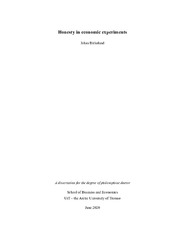Honesty in economic experiments
Permanent lenke
https://hdl.handle.net/10037/19795Dato
2020-12-14Type
Doctoral thesisDoktorgradsavhandling
Forfatter
Birkelund, JohanSammendrag
This thesis investigates preferences for honesty in economic experiments. Preferences for honesty have attained a fair amount of attention in the last couple of decades, from multiple areas within the social sciences, including economics. This thesis may serve as an introduction to the field. First, it provides an introduction to experiments in economics, before it dives into how economists conduct research on honesty. The literature in the thesis provides background to the three research papers reported in the last chapter. Through different experimental tasks for studying honesty, this thesis provides new insights to several subfields of the literature. The first paper investigates how differences in equality affect preferences for honesty and generosity through a real effort dictator game, allowing for dishonest reports in the production stage. Comparing behavior across treatments, we find that when participants know they are at a relative disadvantage, they are significantly more dishonest and significantly less generous. Results speak to the literature on moral balancing, self-justification for dishonest behavior and generosity. The second paper combine a survey instrument designed to measure individual cultural worldviews and a coin-flip honesty task. The data fail to support the conjecture that adherents of certain worldviews are more honest on the aggregate level. However, when data is disaggregated by gender, the worldviews help in explaining the observed gender effect in the data. Results suggest that cultural worldviews may help provide a more nuanced understanding of the gender differences generally observed in the honesty literature. The final paper of this thesis investigates whether the choice of payment scheme affect the level of honesty in a real-effort honesty task. Through both a laboratory experiment and a meta-study, the paper finds no evidence of difference between the schemes. This result is in contrast to a study reporting such an effect in an honesty experiment using random outcomes.
Har del(er)
Paper 1: Birkelund, J. & Cherry, T.L. (2020). Institutional inequality and individual preferences for honesty and generosity. Journal of Economic Behavior & Organization, 170, 355-361. Also available at https://doi.org/10.1016/j.jebo.2019.12.014.
Paper 2: Birkelund, J., (2020) Honesty and Cultural Worldviews. (Submitted manuscript).
Paper 3: Birkelund, J., (2020) Cash or Report – comparing two payment schemes in a real effort honesty task. (Submitted manuscript).
Forlag
UiT The Arctic University of NorwayUiT Norges arktiske universitet
Metadata
Vis full innførselSamlinger
Copyright 2020 The Author(s)
Følgende lisensfil er knyttet til denne innførselen:


 English
English norsk
norsk
